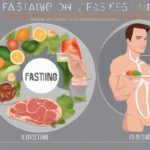Hey there, fellow health enthusiasts! If you’ve ever considered fasting or are already on a fasting journey, you might have wondered how to stay motivated when the hunger pangs kick in or when life gets in the way. Fasting isn’t just a trend; it’s a powerful tool for transforming your health, mind, and body. In this post, we’re diving deep into the incredible fasting benefits that can inspire you to stick with it, backed by science and sprinkled with real-world tips. Whether you’re exploring intermittent fasting, water fasting, or other methods, let’s uncover why fasting is worth the effort and how you can keep your motivation burning bright. Stick with me as we explore the “why” and “how” of fasting success!
What Are the Core Fasting Benefits That Keep You Going?
Let’s start with the big picture: why fast at all? The fasting benefits are more than just weight loss—they span physical, mental, and even cellular health. For many, the initial draw is shedding a few pounds, but research shows fasting can do so much more. It’s like hitting a reset button for your body. Studies have found that fasting can improve insulin sensitivity, helping to manage blood sugar levels and reduce the risk of type 2 diabetes (Barnard et al., 2019). Beyond that, fasting triggers a process called autophagy, where your cells clean out damaged components, potentially slowing aging and reducing disease risk (Mattson et al., 2017). These science-backed perks are a huge motivator when you’re tempted to break your fast early. Knowing your body is literally repairing itself can be the push you need!
How Fasting Boosts Mental Clarity and Emotional Resilience
Ever notice how your mind feels sharper after skipping a heavy meal? That’s not just in your head—well, actually, it is! One of the lesser-known fasting advantages is its impact on brain health. Fasting increases the production of brain-derived neurotrophic factor (BDNF), a protein that supports neuron growth and protects against cognitive decline (Mattson et al., 2018). Many fasters report better focus and emotional stability, which can be a game-changer if you’re juggling a busy life. When I first started intermittent fasting, I was amazed at how much clearer my thoughts were during fasting windows. It’s like giving your brain a break from constant digestion to focus on what matters. This mental boost can be a powerful motivator to keep going, especially when you feel more productive and emotionally grounded.
Fasting for Long-Term Health: A Sustainable Motivation
health benefits of fasting aren’t quick fixes; they’re investments in your future. When you frame fasting as a way to live longer and healthier, skipping that snack doesn’t seem so hard.
Practical Tips to Stay Motivated During Your Fasting Journey
Alright, we’ve covered the “why” behind fasting, but how do you stay committed when motivation dips? I’ve been there—staring at a fridge full of temptation during a 16:8 fasting window. The key is to arm yourself with strategies that make fasting feel doable. Here are some practical tips that have helped me and countless others stay on track with their fasting goals:
- Start Small: If you’re new to fasting, don’t jump into a 24-hour fast. Begin with a 12:12 schedule (12 hours fasting, 12 hours eating) and gradually increase your fasting window.
- Stay Hydrated: Drink plenty of water, herbal teas, or black coffee during fasting periods to curb hunger and keep energy levels up.
- Track Your Progress: Use a journal or app to log how you feel, your weight changes, or even mental clarity. Seeing tangible fasting results can reignite your drive.
- Find a Community: Join online fasting groups or forums. Sharing struggles and successes with others can make you feel less alone.
Overcoming Common Fasting Challenges with Mindset Shifts
Fasting isn’t always smooth sailing. Hunger, social pressures, and even self-doubt can derail your efforts. But here’s the thing: motivation isn’t just about willpower; it’s about mindset. When I started fasting, I had to rethink my relationship with food. Instead of seeing fasting as deprivation, I began viewing it as empowerment—a choice to prioritize my health. Let’s break down a few common hurdles and how to tackle them with a positive spin:
- Hunger Pangs: These are normal, especially early on. Distract yourself with a walk, meditation, or a hobby. Remind yourself that hunger often passes in waves.
- Social Events: Eating with friends or family can be tricky. Plan your fasting windows around events when possible, or sip water while explaining your goals—most people are supportive!
- Plateaus: If weight loss or other fasting perks stall, don’t give up. Reassess your eating window or calorie intake during non-fasting hours. Progress isn’t always linear.
- Cravings: Cravings can hit hard. Keep busy, and remember why you started—whether it’s for energy, health, or discipline, focus on the bigger picture.
Personalizing Your Fasting Plan for Maximum Motivation
Here’s a little secret: there’s no one-size-fits-all when it comes to fasting. Part of staying motivated is finding a fasting style that fits your life. Whether it’s the 16:8 method (fast for 16 hours, eat during an 8-hour window), the 5:2 approach (eat normally 5 days, restrict calories on 2 days), or a full-day water fast once a week, experiment to see what feels sustainable. I started with 16:8 because it aligned with my work schedule, and it made sticking to fasting so much easier. Tailoring your plan to your routine can amplify the positive effects of fasting and keep you excited to continue. Plus, research supports that personalized fasting regimens can still deliver health benefits like improved metabolic markers (Trepanowski et al., 2017). So, play around, listen to your body, and make fasting yours.
As we wrap up, let me leave you with this: fasting isn’t just about skipping meals—it’s about unlocking a healthier, more vibrant version of yourself. The fasting benefits we’ve explored, from better physical health to sharper mental focus, are powerful reasons to stay the course. Yes, there will be tough days, but with the right mindset, practical strategies, and a personalized approach, you can make fasting a sustainable part of your life. Remember why you started, celebrate small wins, and keep learning about how fasting can work for you. You’ve got this! Drop a comment if you’ve got fasting tips or stories to share—I’d love to hear how you stay motivated on your journey to better health.
References
- Barnard, N. D., Levin, S. M., & Yokoyama, Y. (2019). A systematic review and meta-analysis of changes in body weight in clinical trials of vegetarian diets. Journal of the Academy of Nutrition and Dietetics, 119(2), 291-302. https://doi.org/10.1016/j.jand.2018.11.016
- Cell Metabolism, 19(2), 181-192. https://doi.org/10.1016/j.cmet.2013.12.008
- Mattson, M. P., Longo, V. D., & Harvie, M. (2017). Impact of intermittent fasting on health and disease processes. Ageing Research Reviews, 39, 46-58. https://doi.org/10.1016/j.arr.2016.10.005
- Mattson, M. P., Moehl, K., Ghena, N., Schmaedick, M., & Cheng, A. (2018). Intermittent metabolic switching, neuroplasticity and brain health. Nature Reviews Neuroscience, 19(2), 63-80. https://doi.org/10.1038/nrn.2017.156
- Trepanowski, J. F., Kroeger, C. M., Barnosky, A., Klempel, M. C., Bhutani, S., Hoddy, K. K., … & Varady, K. A. (2017). Effect of alternate-day fasting on weight loss, weight maintenance, and cardioprotection among metabolically healthy obese adults: A randomized clinical trial. JAMA Internal Medicine, 177(7), 930-938. https://doi.org/10.1001/jamainternmed.2017.0936






